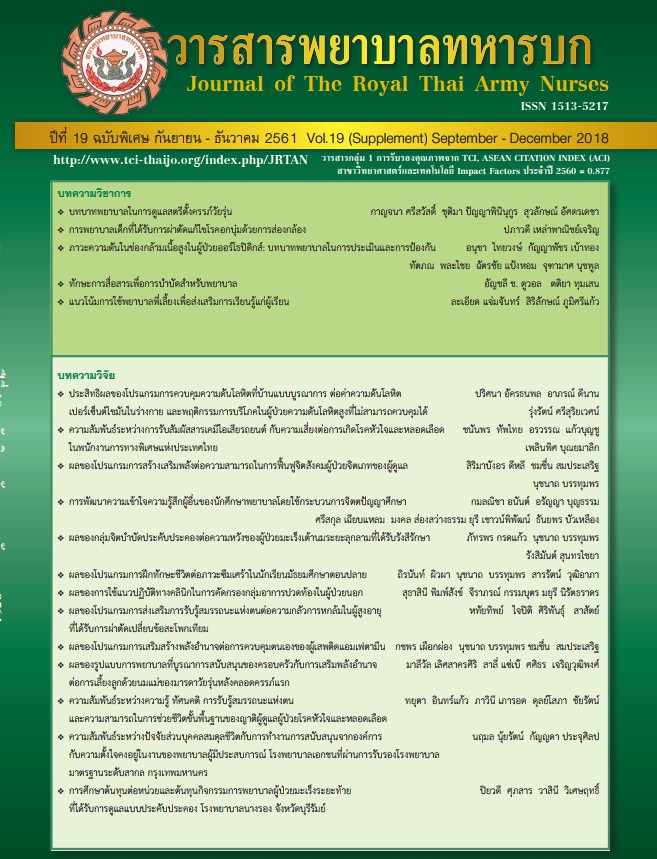The Effect of Using Humanitude Concept by Family Caregivers Care on Depression in Older Persons with Stroke
Keywords:
Humanitude, Family caregiver, Post stroke depressionAbstract
The study design is quasi-experimental with a pre-posttest control group examining the effect of using the humanitude concept by family caregivers care on depression in older persons with strokes. The humanitude concept 21 was applied to the development of the intervention. The participants were 44 family caregivers of older persons and older persons with post stroke depression who met the inclusion criteria. They were randomly assigned into one experimental group with 22 subjects and a control group with 22 subjects, matched by sex, age, Barthel ADL Index, depression level and relationship of the family caregiver to the older person. The control group received routine nursing care. The experimental group receiving the humanitude concept by family caregiver care was tested for content validity by the experts. The data collecting instrument was the Thai Geriatric Depression Scale (TGDS) with the reliability of 0.93 and the data were analyzed using mean, standard deviation, and t-test. The results showed depression among older persons with strokes after participating using the humanitude concept by family caregiver care were significantly lower than before using the humanitude concept by family caregiver care and lower than the control group, at p .05 level.
Downloads
References
2. Robinson RG, Spalletta G. Poststroke depression: A review. Can J Psychiatry. 2010 jun;55:341-49. PMID: 20540828.
3. Starkstein SE, Brockman S, Hayhow B. Chapter 3 depression after stroke. In: Ferro JM, editor. Neuropsychiatric Symptoms of Cerebrovascular Diseases. Lisboa, Portugal: Springer London; 2013. P. 51-64. DOI: 10.1007/978-1-4471-2428-3.
4. Koh KB. Chapter 16 poststroke depression: mechanisms and management. In: Koh KB, editor. Somatization and psychosomatic symptoms. Media New York: Springer; 2013. p. 207-23.
5. Nantaka P, Jaimjit S. Cognitive impairment in elderly patients with acute stroke. North-Eastern Thai Journal of Neurosience. 2012;7(1): 66-79. (in Thai).
6. Sukjaroen T. Stroke comprehensive care: poststroke depression. In: Chunna S, Kamon K, editors. Health equity through innovation and collaboration 2008. Bangkok; Chulalongkorn University; 2008. p. 29-38. (in Thai)
7. Hackett ML, Anderson CS. Predictors of depression after stroke: A systematic review of observational studies. Stroke. 2005;36:2296-301.
8. Hackett ML, Köhler S, T O’ Brien J, Mead GE. Neuropsychiatric outcomes of stroke. The Lancet Neurology. 2014;13(5):525-34.
9. Monton W. Relationship between poststroke depression and lesion location [master thesis of science in medicine]. Bangkok: Chulalongkorn University. 2009. (in Thai).
10. Ferro JM, Caeiro L, Figueira ML. Neuropsychiatric sequelae of stroke. Nat Rev Neurol. 2016;12: 269-80. doi: 10.1038/nrneurol.2016.46.
11. Metoki N, Sugawara N, Hagii J, Saito S, Shiroto H, Tomita T, Yasui-Furukori N, et al. Relationship between the lesion location of acute ischemic stroke and early depressive symptoms in Japanese patients. Annals of General Psychiatry. 2016;15(1): 1-6.
12. Sathirapanya C, Sathirapanya P. Factors influencing depression among patients with stroke. Songkla Med J 2005;23(Suppl 2):229-37. (in Thai).
13. Li SC, Wang KY, Lin JC. Depression and related factors in elderly patients with occlusion stroke. Journal of Nursing Research 2003; 11(1):9-18.
14. Panomkorn H. Alternative : Predictors of depression in patients with stroke [master thesis of nursing science]. Chonburi: Burapha University; 2012. (in Thai).
15. Chophaka S, Sirion S. Predicting factors of depression in older people post-stroke in urban communities. J Nurs Sci. 2012;30(1):28-39. (in Thai).
16 Kingkaew P, editor. Rehabilitation in stroke patient. N.P.press part., Ltd: Bangkok; 2012. (in Thai)
17. Watkins CL, Auton MF, Deans CF, Dickinson HA, Jack CI, Lightbody CE, et al. Motivational interviewing early after acute stroke a randomized, controlled trial. Stroke 2007; 38(3): 1004-9.
18. Praesiri Y. The effect of therapeutic nursing intervention using music activities on depression in elderly patients with ischemic stroke [master thesis of nursing science]. Bangkok: Chulalongkorn University. 2014. (in Thai).
19. Charit W. The effect of empowerment program of older persons with stroke [master thesis of nursing science]. Bangkok: Chulalongkorn University. 2013. (in Thai).
20. Chumbler NR., Rittman M, Van PM, Vogel MB, Qin H. The sense of coherence, burden, and depressive symptoms in informal caregivers during the first month after stroke. Int J Geriatr Psychiatry, 2004;19(10):944-953.
21. Gineste Y, Pellissier J. Humanitude: comprendre la vieillesse, prendre soin des hommes vieux: A. Colin; 2007.
22. Honda M, Mori M, Hayashi S, Moriya K, Marescotti R, Gineste Y. The effectiveness of French origin dementia care method; humanitude to acute care hospital in Japan. European Geriatric Medicine. 2013;4(1):S142-S216.
23. Burns N, Glove KS. The practice of nursing research: appraisal, synthesis, and generation of evidence. 6th ed. United States of American: Elsevier Inc. 2009.
24. Brain rehabilitation group. Thai Geriatric Depression Scale: TGDS. Siriraj Medical Journal. 1994; 46(1):1-9. (in Thai).
25. Suthichai J. Principles of geriatric medicine. 3rd ed. Bangkok: Chulalongkorn university. 2001. (in Thai).
26. Pranee M, Kannikar C. Assessing quality of research instrument in nursing research. Journal of The Royal Thai Army Nurses. 2018;19(1):9-15. (in Thai).
27. Vitchuta P, Chanokporn J, Siriphan S. Selected factors related to depression in post acute stroke patients. Journal of The Police Nurse. 2014;6(2):33-43. (in Thai).
Downloads
Published
How to Cite
Issue
Section
License
บทความหรือข้อคิดเห็นใดใดที่ปรากฏในวารสารพยาบาลทหารบกเป็นวรรณกรรมของผู้เขียน ซึ่งบรรณาธิการหรือสมาคมพยาบาลทหารบก ไม่จำเป็นต้องเห็นด้วย
บทความที่ได้รับการตีพิมพ์เป็นลิขสิทธิ์ของวารสารพยาบาลทหารบก
The ideas and opinions expressed in the Journal of The Royal Thai Army Nurses are those of the authors and not necessarily those
of the editor or Royal Thai Army Nurses Association.






